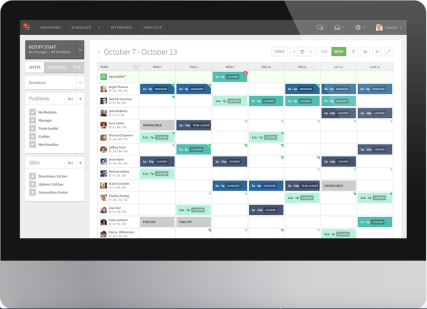Generally, I’m a tech optimist. I truly believe that we are living in the most exciting times and that life in general for most people is only going to get better. Anyone who thinks this is crazy should stop focusing on the fluctuations of the last 10 years and look at the bigger picture. kings and queens of the middle ages would be envious of the information, opportunities, free time and services and that available to the average worker in the west. if your focus is more on the developing world a quick glance at humanprogress.org will show you that indicators such as education, basic healthcare and life expectancy are generally on the increase. Sad pictures on the news give you a snapshot of clearly less than perfect situations but fail to show the progress.
However, because the general trend is positive we can’t stick our heads in the sand and ignore examples of regression. Today when browsing through my tech list I came across a piece in the NewYork Times about rostering software and its effect on low-income workers. The theory behind roster optimising software has been around for ages. It relies on permutations, an area of math that figures out different ways of achieving an outcome with parameters. The branch of math is called group theory, which is also used in cryptography, particle physics, DNA, logic and much more. Computers have harnessed this before when playing chess against humans. The exciting thing is that advances in computing power and code language combined with the increase in data has lead to this becoming commercially viable, hence the rostering systems. But how is this used?

We can go two ways with this. The British cycling team showed that marginal gains can give a team the edge. Sadly others used this concept in the opposite fashion. A famous example was an airline removing one olive from every salad, in turn saving huge amounts of money. Some used marginal gains to optimise performance, others used it to try and get away with providing the least at every opportunity. The same can be said for rostering permutations. We can take into account thousands of variables providing the best rosters for workers needs. Or we can not care about the worker and use it to try and pay them the least we can get away with. The article told me the story of a single mother working at Starbucks. She was a few credits away from getting her associates degree. She wanted to get a masters. However, the rostering software was optimised for profit and gave her sporadic shifts. The software focused on sales and would give her shifts 3 days in advance. She couldn’t plan anything or attend classes and she slowly burnt bridges in her social circle by constantly arranging last minute child care at short notice. By the end, she had given up on her dreams and just hoped that she would get shift manager. The rostering system did not only crush her dreams, it created an unstable environment for her son, who was woken up in the early hours of the morning to be looked after my friends a long distance away as they were the only ones who could accommodate at short notice. He sometimes had to wait as his mother finished at 10pm.
Workers at the government-funded daycare centre said that this was common. It’s not irrational to speculate that this rostering optimisation will stunt the development of working class children. Whilst I love tech, machine learning and optimisation, this is a sobering reminder that we have a social responsibility when optimising.


I agree.
Plus point though. As a hard worker, the boss who did the rosters used to put me on nights with her every time and I hated the lazy bitch. Now I get to hate a variety of asshole bosses throughout the week
LikeLiked by 1 person
I’m sorry to hear that. Rostering is a simple concept, a nightmare to execute and a real moral crusher if abused. I hope your hard work gets recognised. In my experience, hard work doesn’t get rewarded, just utilised. Best advice I got was, turn up, do your job and try and develop your career outside your job. Keeps you out of the work politics. I never went for a promotion internally and I don’t regret it.
LikeLike